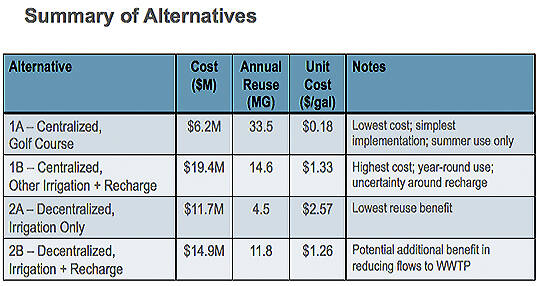The term “water hazard” could take on a whole new meaning at the private Wing Point Golf Course on Bainbridge Island.
The City Council is worried about the lack of water on BI as a sole source aquifer and the regional desire for more people to live here. Conserving water will be a huge issue in the future.
At the council meeting Feb. 18, it found out Wing Point uses 33.5 million gallons a year.
“These numbers blew me away,” Mayor Ashley Mathews said.
Councilmember Clarence Moriwaki added, that’s “incredibly shocking to me.” He said that he knew golf courses use a lot of water, but Wing Point uses more water in a month than Sakai Intermediate School uses in a year. “There’s got to be some conservation there.”
Mathews said, “There needs to be some personal responsibility.” Wing Point is going through some changes, and she said if she had known about the water situation she would have wanted to include that in the discussion.
“Water conservation is critical,” Councilmember Joe Deets said, adding Wing Point uses as much water as 330 households.
Moriwaki and Councilmember Kirsten Hytopoulos said a private course should not be using that much public water.
Jeff Hansen, a consultant with HDR, presented results of a study on wastewater reuse as a substitute for irrigation and/or groundwater recharge. Two options presented are upgrading the Winslow Wastewater Treatment Plant or developing a small satellite treatment plant to use some of the city’s sewer flows to be treated as reclaimed water.
A PowerPoint presentation shows reclaimed water could be used to irrigate Wing Point, along with city parks and school fields. The golf course alternative would cost $6.2 million and the other $19.4 million. With more investment, it could even be used for commercial uses and toilet flushing. The satellite treatment alternative would cost $11.7 million to $14.9 million.
Hytopoulos said she was surprised by the low cost. But that’s because the size of the satellite plant is much smaller than BI’s wastewater treatment plant. And, it would not treat biosolids. She said the goal is to pump less affluent into Puget Sound and keep more on land. “Recharge is important no matter what,” she said.
City manager Blair King said reusing wastewater is an issue that won’t go away. “Sooner or later we’ll be doing this.” He said BI should not be using potable water to water grass. He said some people don’t like the idea of wastewater being reused, but emphasized it’s for irrigation or recharge, not drinking.
Because it was a work session no vote was taken on that issue or this one.
The council talked about sewer connections. The city contracts with Kitsap County Sewer District 7 for wastewater treatment on the south end of BI. The city has 480 connections; 350 are connected and the other 130 reserved. The city obtained 25 more last year. It plans to award up to seven a year to homes with failing septic systems near critical areas, as well as affordable and commercial units with no other options.
Hytopoulos had an issue with “failing” septic systems. She wants someone with expertise, like with the health district, to make that determination. She also had an issue with the commercial aspect, saying it favors big users. Finally, as an equity issue, she said if people don’t qualify for sewer, “You have to fix your septics regardless of cost.”
Councilmember Brenda Fantroy-Johnson added, “Tightening up for commercial is the most important thing here.”
Moriwaki said it was a good policy because it encourages affordable housing.
Hytopoulos added it’s one thing to let someone hook up to sewer because they have a failing septic system, and another to let them do it to make their property more valuable.
Mathews said her parents are dealing with this issue, so while the council was talking about units, “These are people we are talking about.”
Deputy mayor Jon Quitslund said he was going to sound like a “maverick” because his stance was different than the others. “I’m not comfortable with the attitude that sewers promote development that we want to prevent,” he said.
Quitslund added that to build affordable housing there must be different types. Some work better with septic and others with sewer. What’s best for the environment will depend on geography and soil conditions.
The council will look at both issues again as staff tries to come up with compromises all will agree to.



